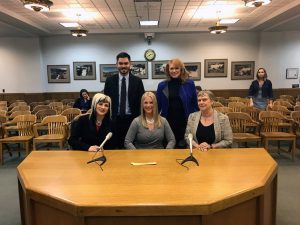
Legislation Update: the week of May 30, three bills approved by the House also passed the Oregon Senate. These three bills will help crack down on animal abuse in our state.
OHS supported the three bills—HB 2625, HB 3177 and HB 3283—which you can find more detail on here. Two of these bills now go directly to the Governor for signature, while one goes back to the House for final consideration due to an amendment that was made after its initial House passage.
OHS applauds the passage of these bills, which will strengthen protections for animals in Oregon. Watch our Current Legislation page for further updates.
The Oregon Senate Democrats issued a press release celebrating the success of these bills, which is excerpted below:
SALEM—Cruelty to animals is something Oregonians don’t tolerate, and the Oregon Senate stood by that philosophy by passing a trio of bills recently that will crack down on those who commit these horrific crimes.
The bills range from removing animals from those who are abusive or neglectful to stiffening restrictions for those convicted of abuse and cruelty. The bills were carried by three Democratic senators—Sen. Floyd Prozanski (D-Eugene), Sen. James Manning (D-Eugene) and Sen. Michael Dembrow (D-Portland).
“Cruelty and abuse to animals—whether out of anger, sick entertainment or for financial gain—is reprehensible and there is no place for it in any society at any point in time,” Prozanski said. “When someone abuses or neglects animals, those animals should be removed from harmful, neglectful and abusive situations.”
Prozanski carried House Bill 2625 to passage on the Senate floor. The bill allows counties or animal care agencies to pursue forfeiture of animals seized in cases that involve animal neglect or abuse, regardless of whether any of the criminal charges involve that specific animal. The potential forfeiture would be based on the outcome of the criminal case. If a person is found to be not guilty, they would be able to keep the animal.
House Bill 3177—carried by Manning—authorizes the seizure and forfeiture of hens and chicks associated with cockfighting. Currently, when a criminal conviction related to cockfighting occurs, the fighting birds are forfeited by the owner. This bill expands that to include “source birds” which are intended to produce or become at some point fighting birds.
“It makes no sense to simply remove the fighting birds from these people’s possession, while still leaving them with more innocent birds that they can turn into fighting animals, or use them to breed fighting birds,” Manning said. “This is a horrible practice and we must do everything we can to make sure cruelty to animals does not stand in Oregon for some sort of sick amusement. This bill helps to limit cockfighting in Oregon.”
Dembrow carried House Bill 3283 to passage on the Senate floor. The bill increases the length of time a person convicted of felony animal neglect is prohibited from possessing an animal of the same type that was neglected. The current length of the restriction is 5 years; this bill extends it to 15 years.
“When someone shows neglect—either through willfulness or unconscious negligence—they should not be able to put another animal in that situation,” Dembrow said. “It makes no sense to allow them to have another animal so soon after they have been convicted of failing or choosing not to care properly for the animals in their care before.”
Two bills passed on Thursday and HB 3283 passed the Senate on Tuesday. HB 2625 and HB 3177 now go to Gov. Kate Brown for signature. HB 3283 underwent a minor amendment before the Senate approved it, so it returns to the House for final consideration before it can proceed to the Governor for signature.
Case Studies
Here, you can read OHS case studies that were submitted in support of these bills and others »
OHS supported these bills based on specific cases in which OHS Investigations was involved. With the passage of these bills, agencies such as OHS will be better able to help animals in future situations.







